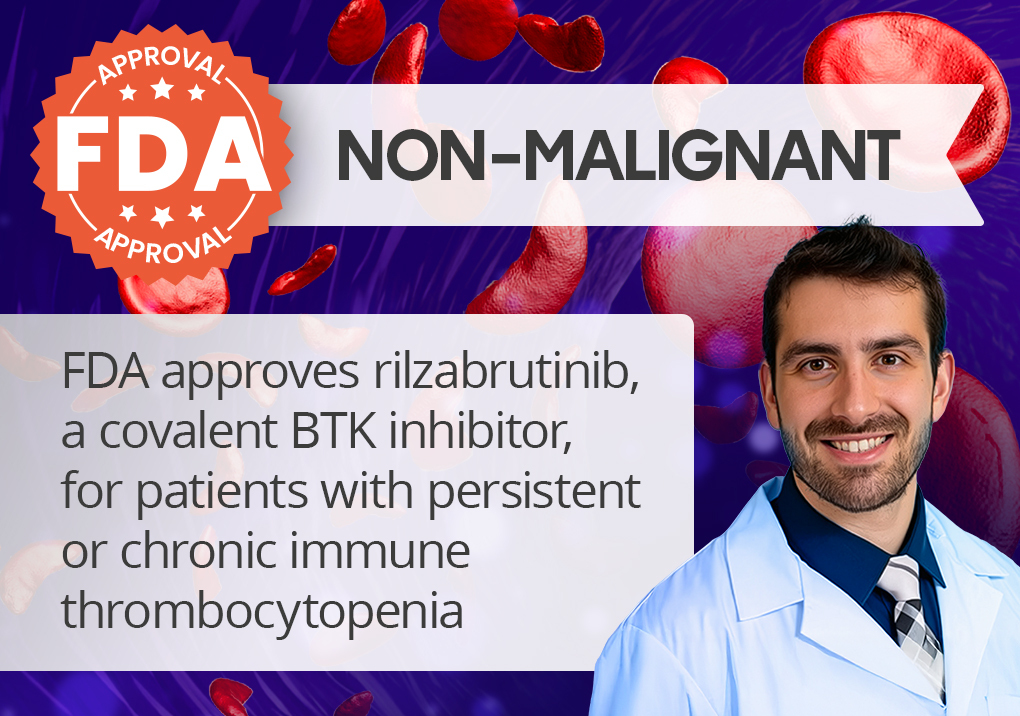FDA approves rilzabrutinib, a covalent BTK inhibitor, for patients with persistent or chronic immune thrombocytopenia
On August 29, 2025, the U.S. Food and Drug Administration (FDA) approved rilzabrutinib, an oral Bruton’s tyrosine kinase inhibitor (BTKi), for adult patients with persistent or chronic immune thrombocytopenia (ITP).1
ITP is a rare hematological autoimmune disease characterized by thrombocytopenia (platelet count < 100 x 109/ L) caused by immune-mediated destruction and impaired production of platelets.2 This isolated thrombocytopenia results in elevated bleeding risk, increased likelihood of hospitalization, and significantly affects the health-related quality of life (HRQoL) and fatigue levels of patients.2
Although several first-line therapies exist to elevate platelet counts, many initial responders do not experience long-term, durable remissions and therefore require second-line treatment.2 Individuals with chronic ITP who relapse following these therapies represent an unmet clinical need, and novel approaches are being explored to increase platelet counts, prolong remission, reduce the side effects associated with long-term use of corticosteroids, and address the impact of disease on HRQoL.
Rilzabrutinib is a reversible, covalent BTK inhibitor developed to increase platelet counts in patients with ITP via a dual mechanism of action: the agent decreases macrophage-mediated platelet destruction while also reducing the production of pathogenic autoantibodies.2 Rilzabrutinib also has a high specificity, which may decrease off-target toxicity observed with other BTKis.2
The approval of rilzabrutinib is supported by findings from the Phase III multicenter, placebo-controlled, parallel-group LUNA3 study (NCT04562766), which investigated the efficacy and safety of rilzabrutinib treatment in adults with persistent or chronic ITP. 3 LUNA3 randomized 202 adults with ITP to receive 400 mg of rilzabrutinib twice daily (n = 133) or placebo (n = 69) for up to 24 weeks, followed by a 28-week open-label period. Patients enrolled in the trial were heavily pre-treated, with a median of four prior unique lines of therapy, and 46% of patients received ≥5 prior therapies. 3
The primary efficacy endpoint of the LUNA3 trial was durable platelet response, with two definitions being utilized. The first accounted for potential missing platelet counts, and was based on the proportion (≥ two-thirds) of available platelet counts (≥8 non-missing weekly measurements) of ≥50 × 109/L during the last 12 weeks of the 24-week blinded treatment period without rescue therapy. The second definition was based on a fixed number of platelet counts (≥8) of ≥50 × 109/L during the last 12 weeks. When using either definition, durable platelet response was observed in 23% of patients receiving rilzabrutinib (95% CI: 16-30%) and in 0% of patients enrolled in the placebo arm (95% CI: 0-0%; p <0.0001).3 The overall response rate (ORR) was 40% in the rilzabrutinib arm and 9% in the placebo arm, and the complete response (CR) rate was 22% and 3%, respectively.3
All key secondary endpoints were met, with rilzabrutinib treatment leading to statistically significant improvement in bleeding (based on the ITP Bleeding Score) and in physical fatigue (based on the ITP Patient Assessment Questionnaire [ITP-PAQ] Item 10 score). Rilzabrunitib treatment also led to a 52% reduction in the need for rescue therapy (p = 0.0007).3 Regarding safety, the rate of any cause adverse events (AEs) was comparable in patients receiving rilzabrutinib versus placebo (83% versus 75%, respectively). Treatment-related AEs were predominantly low-grade (grade 1/2), with the most common being diarrhea (23%), nausea (17%), headache (8%), and abdominal pain (6%). The safety profile of rilzabrutinib was consistent with prior published data, and relative to other BTKis, the agent demonstrated lower rates of severe infections and cardiac-, liver-, cytopenia-, or bleeding-related AEs.3
We recently caught up with Hanny Al-Samkari, MD, of Massachusetts General Hospital, Boston, MA, to hear about the role of rilzabrutinib in the treatment of ITP. “The data that we have right now is in the third line or later, which certainly the drug has promise there, and it has worked for many patients where other therapies have all failed, which provides, I think, a really attractive treatment option for people who have failed thrombopoietin receptor agonists, rituximab, and possibly fostamatinib. I’m hopeful to see additional data with rilzabrutinib earlier in the course of ITP and see how the response rates look in patients receiving the drug in perhaps second line and maybe even in combination therapy in first line.”, Dr Al-Samkari stated.
The approval of this therapy provides a novel treatment option for patients with persistent or chronic ITP, addressing limitations of current therapeutic strategies that remain insufficient for many patients with this disease. Rilzabrutinib also holds potential for the management of other rare autoimmune diseases, having been granted orphan drug designation by the FDA for both warm autoimmune hemolytic anemia (wAIHA) and IgG4-related disease (IgG4-RD).4
References
- Sanofi. Press Release: Sanofi’s Wayrilz approved in US as first BTK inhibitor for immune thrombocytopenia. Available here. (Last accessed 30/08/2025).
- Kuter DJ, Efraim M, Mayer J, et al. Rilzabrutinib, an Oral BTK Inhibitor, in Immune Thrombocytopenia. N Engl J Med. 2022 Apr; 386(15):1421-1431.
- Kuter DJ, Ghanima W, Cooper N, et al. Safety and efficacy of rilzabrutinib vs placebo in adults with immune thrombocytopenia: the phase 3 LUNA3 study. Blood. 2025 Jun;145(24):2914-2926.
- Sanofi. Press Release: Rilzabrutinib granted orphan drug designation in the US for two rare diseases with no approved medicines. Available here. (Last accessed 29/08/2025).
Written by Natalie Markova
Edited by Anya Dragojlovic Kerkache





